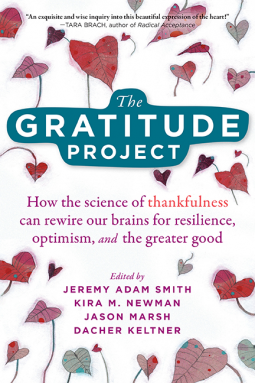
Literature
Literary Scene: Self-Improvement
By Ryan G. Van Cleave
September 1, 2020

The Gratitude Project:
How Cultivating Thankfulness Can Rewire Your Brain for Resilience, Optimism, and the Greater Good
Edited by Jeremy Adam Smith, Kira Newman,
Jason Marsh, and Dacher Keltner
While I’m leery of subtitles that are 2x longer (or more!) than the actual title, this one makes a big promise, so I decided to give it a shot. I’m glad I did, too. Because prior to seeing this book, I didn’t know about the University of California, Berkeley’s Greater Good Science Center, which since 2001 has committed to exploring “the roots of happy and compassionate individuals, strong social bonds, and altruistic behavior—the science of a meaningful life.”
The pieces collected in this book—some direct from their online magazine, Greater Good (www.greatergood.berkeley.edu)—build on the insights, tips, and research their organization has compiled over the years. What has some of that research shown? For one thing, that studies consistently report how people who regularly practice gratitude report far “fewer symptoms of illness, including depression, and more optimism and happiness.” Their research also shows that they enjoy stronger relationship with friends, family members, and coworkers.
Sociologist Georg Simmel claims that gratitude encourages us to both appreciate these gifts but also to pay them forward, which is a type of “moral memory of mankind.” Many of these pieces echo that idea of moving from gratitude to action. Others delve into the psychology and neuroscience of gratitude. Perhaps more important, this book offers solutions such as to how a state of thankfulness can be created and applied—both on a personal and communal level—for the betterment of all.
Maybe it’s just the strange, isolated times we’re in, but this feels like an especially timely book. Some of the chapters I found most compelling are “The Surprising Neural Link Between Giving and Gratitude,” “How Gender Shapes Gratitude,” “How Gratitude Can Help Couples Through Illness,” and “Five Ways to Cultivate Gratitude at Work.”
With contributions by researchers, public figures, and others, this book goes beyond mere platitudes to offer something for most any reader who comes with an open mind and open heart.
Ryan’s Rating: 4.25 out of 5

Your Next Five Moves: Master the Art of Business Strategy
by Patrick Bet-David
Some of you might already know Patrick Bet-David as the creator of Valuetainment—a leading YouTube channel for entrepreneurs. But he’s an author, too, and his new book is a “practical and effective guide for thinking more clearly and achieving your most audacious business goals.” Lofty sounding, right? But that’s what he’s all about in his own life—moving to the new higher level.
What I like about the book is the clarity of language he uses—you’re not going to find academic-speak in these pages. For example, consider business principle #1: No one has 100% job security including the founder or CEO. Or principle #2: What brought us here, won’t take us to the next level. Those are plain-English ideas that readers can ponder and soon find ways to incorporate into their own lives.
If you don’t run your own business, a few of these tips (like how to scale your business) don’t apply at the moment. But much of what’s being offered here can help you gain control and stability in a world in major flux. Underpinning much of this book is the mindset that constant reflection and improvement is a must for success.
In short, his passion is clear on every page, and his stern approach might be a bit cold, but as he shares in numerous anecdotes, when he lets emotions run the show, bad things have happened.
For any serious executive or entrepreneur, this down-to-earth and experience-based book will help you see possibilities you likely haven’t before.
Ryan’s Rating: 4 out of 5
www.YourNextFiveMoves.com

The Highly Sensitive Person’s Guide to Dealing with Toxic People
By Shahida Arabi
While I wouldn’t consider myself a try HSP (highly sensitive person), I’m comfortably on the empath side of the equation. Many people find themselves right there with me, feeling easily overwhelmed by the world, suffering from needing to always people-please, and experiencing stress in any conflict. In and of itself, notes motivational coach and bestselling author Arabi, that’s not an issue. But the naturally giving nature of these people makes them a frequent target by narcissists and self-centered individuals who simply see others as an opportunity to exploit for their own game.
You can protect yourself, though, explains Arabi. She offers evidence-based skills that are firmly grounded in cognitive-behavioral therapy (CBT) and dialectical behavior therapy (DBT). Through the use of these skills, you’ll both notice and be empowered to shut down common tactics of manipulation, such as stonewalling, covert put-downs, and love bombing.
Arabi also offers targeted tips on how to protect yourself from the five main types of toxic people: garden-variety boundary-steppers; crazymakers and attention-seekers; emotional vampires; narcissists; and sociopaths/psychopaths.
If you’ve ever wanted to create healthier boundaries and improve your sense of self, this book has the combination of practical strategies and welcome wisdom to help make a difference. There are plenty of journal reflections and other suggested activities here to keep one busy for a good while.
Ryan’s Rating: 4 out of 5
www.ShahidaArabi.com



You must be logged in to post a comment Login